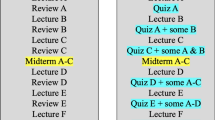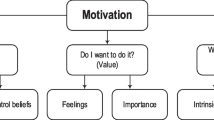Abstract
Providing feedback is one of the most important and yet most challenging tasks in medical education. Traditional models of feedback begin and end with the delivery of the message by the educator. Current literature indicates that key components are needed to enable a learner to hear, process, and put into action the components of the feedback message. There must be instructor commitment to the establishment of an educational culture accepting and encouraging of feedback. There must also be dedication to the development of a relationship so that the learner perceives the feedback as coming from a firsthand knowledge of performance and a position of beneficence.
Similar content being viewed by others
References
Henderson P, Ferguson-Smith AC, Johnson MH. Developing essential professional skills: a framework for teaching and learning about feedback. BMC Med Educ. 2005;5(1):11. doi:10.1186/1472-6920-5-11.
Ende J, Pomerantz A, Erickson F. Preceptors’ strategies for correcting residents in an ambulatory care medicine setting: a qualitative analysis. Acad Med. 1995;70(3):224–9.
Ilgen DR, Davis CA. Bearing bad news: reactions to negative performance feedback. Appl Psychol: Int Rev. 2000;49(3):550.
Ende J. Feedback in clinical medical education. JAMA. 1983;250(6):777–81.
Kluger AN, Van Dijk D. Feedback, the various tasks of the doctor, and the feed forward alternative. Med Educ. 2010;44(12):1166–74. doi:10.1111/j.1365-2923.2010.03849.x.
Eva KW, Armson H, Holmboe E, Lockyer J, Loney E, Mann K, et al. Factors influencing responsiveness to feedback: on the interplay between fear, confidence, and reasoning processes. Adv Health Sci Educ Theory Pract. 2012;17(1):15–26. doi:10.1007/s10459-011-9290-7.
Hattie J, Timperley H. The power of feedback. Rev Educ Res. 2007;77(1):81–112. doi:10.3102/003465430298487.
Ashford SJ. Feedback-seeking in individual adaptation: a resources perspective. Acad Manag J. 1986;29(3):465–87. doi:10.2307/256219.
Urquhart LM, Rees CE, Ker JS. Making sense of feedback experiences: a multi-school study of medical students’ narratives. Med Educ. 2014;48(2):189–203. doi:10.1111/medu.12304.
Bok HGJ, Teunissen PW, Spruijt A, Fokkema JPI, van Beukelen P, Jaarsma DADC, et al. Clarifying students’ feedback-seeking behaviour in clinical clerkships. Med Educ. 2013;47(3):282–91. doi:10.1111/medu.12054.
Delva D, Sargeant J, Miller S, Holland J, Alexiadis Brown P, Leblanc C, et al. Encouraging residents to seek feedback. Med Teach. 2013;35(12):e1625–31. doi:10.3109/0142159x.2013.806791.
Crommelinck M, Anseel F. Understanding and encouraging feedback-seeking behaviour: a literature review. Med Educ. 2013;47(3):232–41. doi:10.1111/medu.12075.
Boud D, Molloy EK. Feedback in higher and professional education: understanding it and doing it well. New York: Routledge; 2013.
Roscoe R, Chi M. Tutor learning: the role of explaining and responding to questions. Instr Sci. 2008;36(4):321–50.
Stone D, Heen S. Thanks for the feedback: the science and art of receiving feedback well. New York: Viking Penguin; 2014.
Fernando N, Cleland J, McKenzie H, Cassar K. Identifying the factors that determine feedback given to undergraduate medical students following formative mini-CEX assessments. Med Educ. 2008;42(1):89–95. doi:10.1111/j.1365-2923.2007.02939.x.
Author information
Authors and Affiliations
Corresponding author
Rights and permissions
About this article
Cite this article
Cornell, K. Feedback in Medical Education: What Is Our Goal and How Do We Achieve It?. Med.Sci.Educ. 24 (Suppl 1), 5–7 (2014). https://doi.org/10.1007/s40670-014-0085-3
Published:
Issue Date:
DOI: https://doi.org/10.1007/s40670-014-0085-3




